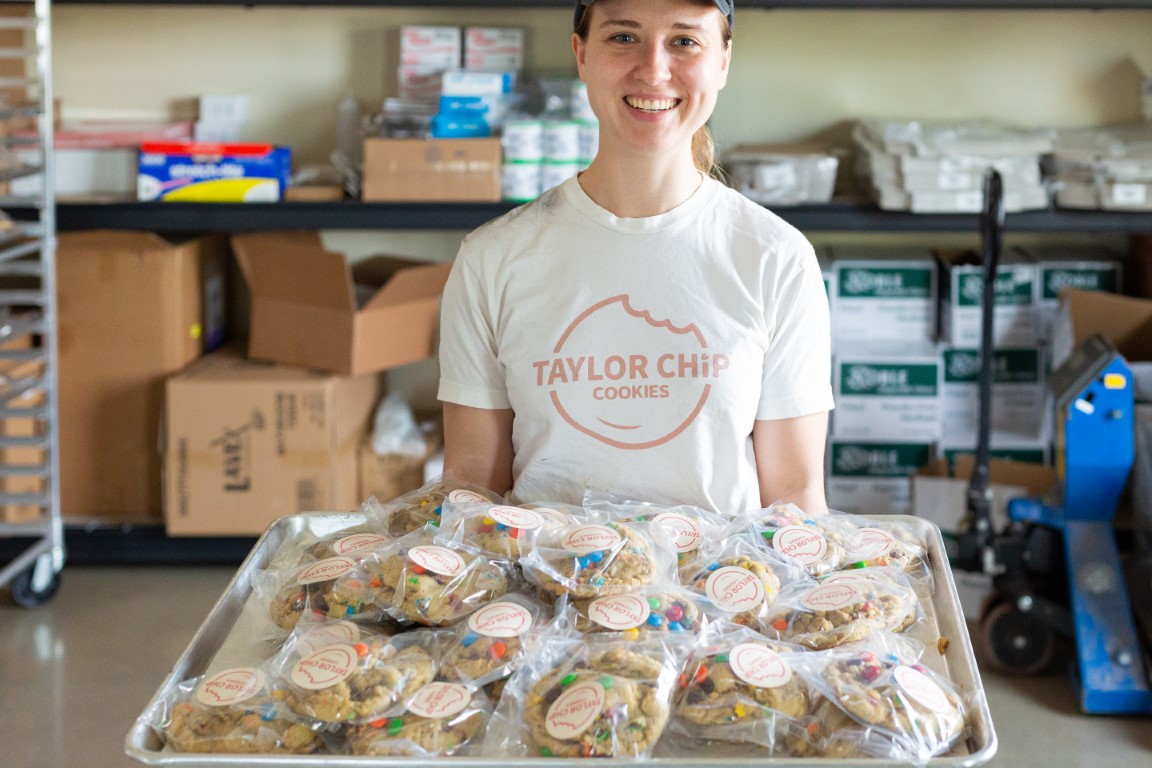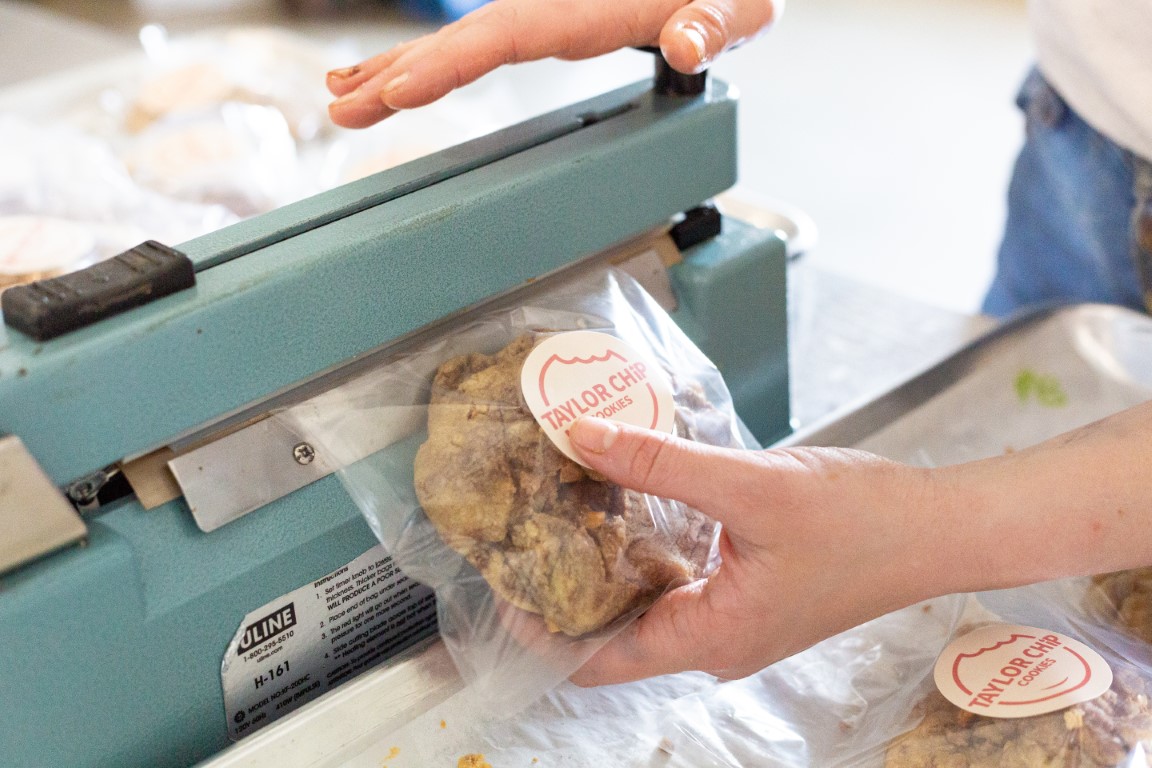You shouldn't use rusty cookie cutters because they can introduce harmful bacteria into your baked goods, posing considerable health risks. Rust, a form of corrosion, occurs due to moisture exposure, which can worsen if the cutters aren't dried properly after washing. Bacteria can thrive in the crevices of rusted surfaces, especially when using food coloring that reacts with the metal. Consider evaluating the extent of rust; light rust might be cleaned with lemon juice and a soft brush, while severe rust often warrants discarding the cutter. Implementing proper cleaning and storage practices can prevent rust, ensuring your baking tools remain safe and effective. Uncover more about safeguarding your tools.
Key Takeaways
- Rusty cookie cutters can harbor harmful bacteria, posing health risks when used for baking.
- Assess the extent of rust; severe corrosion may require discarding the cutter for safety.
- Light rust can sometimes be cleaned with natural solutions like vinegar or baking soda.
- Properly cleaning and thoroughly drying cutters can prevent further rust and ensure safety.
- Regular inspection and maintenance are crucial for preserving cookie cutters' usability and safety.
Understanding Rust and Safety Concerns
When using cookie cutters, it's important to understand the materials they're made from and their susceptibility to rust, as this not only affects the tool's longevity but also raises potential health concerns. Rusty cookie cutters, especially those made from materials like iron or low-grade stainless steel, can harbor bacteria and pose a risk of metal ingestion, making it essential to assess their condition before use. Vintage cookie cutters, often treasured for their nostalgic value, may require special attention due to age-related wear and the possibility of containing harmful metals, so taking proper precautions is crucial for safe baking.
Types of Cookie Cutter Materials and Rust Risk
Cookie cutters come in various materials, each with its own susceptibility to rust. Metal cookie cutters are common, but not all metals have the same rust risk. Here's a quick breakdown:
-
Copper Cookie Cutters: These are less prone to rust but can develop tarnish over time, which can be removed with proper maintenance.
-
Stainless Steel: This material is more resistant to rust, offering a durable and food-safe option. It's important to dry cookie cutters thoroughly to prevent rust spots.
-
Aluminum Cookie Cutters: While aluminum doesn't rust, it can corrode, so gentle cleaning processes are recommended.
For all types, follow cookie cutter maintenance tips, such as ensuring they're fully dry before storage. This will help keep them in good condition and safe for use.
Health Risks of Using Rusty Cookie Cutters
Despite their charming shapes and designs, rusty cookie cutters can pose considerable health risks. When used on baking items, these rusted surfaces can introduce harmful bacteria and metallic residue into your food. This contamination is especially risky if you haven't cleaned the cutters properly. To avoid these health hazards, make sure you clean your cookie cutters thoroughly with soapy water and rinse them in warm water. Pay attention to drying them completely to prevent excess water from causing rust. Avoid water spots by drying cutters immediately, making certain they remain in pristine condition. Using food coloring with rusty cutters can also lead to undesirable chemical reactions. By following these cleaning tips, you can keep your baking tools safe and hygienic.
Special Concerns With Vintage Cookie Cutters
Rusty cookie cutters aren't just a modern kitchen concern; vintage cookie cutters often come with their own unique set of challenges. Tin cookie cutters, unlike their plastic counterparts, are prone to rust, which can pose health risks. Here's a practical cleaning guide:
- Initial Cleaning: Use a scrub brush and clean water to remove surface rust. Be thorough yet gentle.
- Final Touches: Wipe the cookie cutters with a damp cloth; then, dry them in a warm oven to prevent future rusting.
- Regular Maintenance: Regularly inspect your baking tools, especially vintage cookie cutters, for rust and damage.
These cleaning suggestions guarantee your cookie cutters remain safe and functional, preserving the charm of vintage baking tools without compromising safety. Keep them clean and enjoy their nostalgic appeal.
Evaluating Your Cookie Cutters
To guarantee your cookie cutters are in the best condition for use, it's crucial to assess the extent of rust on them, which can range from light surface rust to more severe corrosion that compromises their structure. You should determine whether the rust can be effectively cleaned off, using appropriate methods, or whether the damage is too extensive, warranting disposal of the cutters to maintain safety. By understanding these factors, you can make informed decisions about when your cookie cutters are safe to clean and reuse, or when it's time to discard them entirely.
How To Identify Different Levels of Rust
When you're evaluating your cookie cutters for rust, it's important to identify the varying degrees of corrosion. Here's how you can assess them:
-
Light Rust: Light rust appears as small spots or a thin layer. Use a soft brush to gently scrub the surface, followed by wiping with a clean cloth. A lemon juice mixture and baking soda can help remove these spots.
-
Moderate Rust: This rust covers more surface area and may require a wire brush for effective removal. Scrape gently with a pocket knife blade if necessary, ensuring you don't damage the cutter.
-
Severe Rust: If rust is deep and extensive, it may be beyond simple holiday baking cleanup. Test a small area on a clean baking sheet to check progress before deciding whether to retire the cutter.
When Cookie Cutters Are Safe To Clean
After evaluating the degree of rust on your cookie cutters, it's important to determine if they're safe to clean or if they should be discarded. If the rust is minor, you can attempt rust removal. Start by preparing a bowl of water mixed with fresh lemon juice, as the acidity helps lift rust. Soak the cookie cutters for a few hours, ensuring they're fully submerged. After soaking, use a soft cloth to gently scrub away the rust. For stainless steel or plastic cutters, this method is usually effective. Once rust-free, rinse thoroughly and dry them on a baking sheet. Make sure they're part of your clean dishes before using them for cookie decorating. Always assess if cleaning is worthwhile before proceeding.
When To Discard Rusty Cookie Cutters
Sometimes, the best decision is to part ways with your rusty cookie cutters. If you notice rust forming, it might be time to evaluate your collection and decide which pieces no longer serve your craft of cookie decorating. Discarding them can help reduce cookie clutter and free up space for essential cookie decorating supplies. Consider the following reasons to let go:
- Health Concerns: Rust on cookie cutters can contaminate your dough, posing a health risk.
- Inefficiency: Damaged cutters might not cut cleanly, affecting your cookies' appearance.
- Storage Issues: More space for baking pans, cake pans, and a cookie scoop makes your kitchen more organized.
Instead of struggling with rusty tools, enjoy the efficiency of a clean cookie sheet and fresh lemons in your dishwasher.
Cleaning and Restoring Rusty Cookie Cutters
To effectively clean and restore your rusty cookie cutters, you'll need essential supplies such as mild dish soap, baking soda, white vinegar, and a soft-bristled brush. Start by using these materials in a step-by-step rust removal process, soaking the cutters in a vinegar solution and gently scrubbing away any rust. For those who prefer natural cleaning methods, you can mix baking soda with water to create a paste that helps lift rust without harsh chemicals.
Essential Cleaning Supplies and Materials
When it comes to restoring rusty cookie cutters, having the right cleaning supplies on hand is vital. You'll need a few key items to tackle the rust effectively. Here's a handy list to guide you:
- Baking Powder: This common kitchen ingredient can help gently scrub off rust when mixed with water to form a paste.
- Vinegar: Its acidic nature makes it perfect for breaking down rust, allowing for easier removal.
- Cake Decorating Supplies: Use small brushes or toothpicks from your cake decorating kit to reach into complex designs.
These materials are essential for ensuring your cookie cutters are restored without damaging their delicate edges. Once you've gathered these items, you'll be well-prepared to clean and restore your cherished baking tools.
Step-By-Step Rust Removal Methods
Commence the journey of restoring your rusty cookie cutters with a methodical approach. First, gather your supplies, including a small bowl, white vinegar, a soft cloth, and a brush with stiff bristles. Pour enough vinegar into the bowl to fully submerge your cookie cutters. Soak them for at least an hour, allowing the vinegar to break down the rust. After soaking, use the brush to scrub away remaining rust, applying pressure as needed. Rinse the cookie cutters under warm water, ensuring all vinegar and rust residue are removed. Dry the cutters thoroughly with a soft cloth to prevent further rusting. If rust persists, repeat the process or consider using fine steel wool for more stubborn areas.
Natural Cleaning Solutions and Techniques
A variety of natural cleaning solutions can breathe new life into your rusty cookie cutters. You don't need harsh chemicals to restore their original shine. Here are some effective methods:
-
White Vinegar Soak: Submerge your cookie cutters in a bowl of white vinegar for a few hours. The acid in the vinegar will dissolve the rust. After soaking, scrub with a brush and rinse thoroughly.
-
Baking Soda Paste: Mix baking soda with water to form a paste. Apply it to the rusted areas, let it sit for about 30 minutes, then scrub off the rust with a brush. Rinse well afterwards.
-
Lemon and Salt Scrub: Sprinkle salt over the rusty spots, then rub a cut lemon over the salt. The citric acid and abrasiveness will help remove rust.
Preventing Rust on Cookie Cutters
To prevent rust on your cookie cutters, start by ensuring you clean and dry them thoroughly after each use, as any leftover moisture can lead to rust formation. Store them in a dry and cool place, perhaps using airtight containers or wrapping them in wax paper to minimize exposure to humidity. Regularly inspect your cookie cutters for any signs of rust, and apply a light coat of vegetable oil to protect them, keeping them in ideal condition for your baking needs.
Proper Cleaning and Drying Methods
Rust, the persistent foe of metal kitchenware, can be effectively kept at bay with the right cleaning and drying techniques for your cookie cutters. Start by washing them immediately after use with warm, soapy water. This will remove any dough remnants and prevent moisture from settling. Next, rinse thoroughly to guarantee no soap residues remain.
For drying, follow these steps:
- Hand Dry: Use a clean, soft towel to pat each cutter dry, ensuring you reach any crevices.
- Air Dry: Place them on a rack to air dry completely, avoiding any moisture traps.
- Oven Dry (Optional): For extra assurance, place them in a warm oven (around 200°F) for a few minutes to eliminate hidden moisture.
Effective Storage Solutions
When it comes to preventing rust on your cookie cutters, effective storage is key. First, verify that your cookie cutters are completely dry before storing them. Moisture is a primary cause of rust, so even a little dampness can lead to problems over time. Store your cookie cutters in a dry, cool place, away from humidity. You might consider using airtight containers or resealable plastic bags to minimize exposure to air and moisture. If you have a collection of metal cookie cutters, placing a few silica gel packets in the storage container can help absorb any residual moisture. Stack them carefully to avoid scratches, which can become rust-prone areas. By organizing and storing them properly, you'll keep your cookie cutters in great condition.
Regular Maintenance Tips
After confirming your cookie cutters are stored properly, it's important to focus on regular maintenance to prevent rust. Keeping them in top shape requires a bit of routine care. Here's how you can maintain your cookie cutters:
-
Wash and Dry Thoroughly: Always wash your cookie cutters immediately after use with warm, soapy water. Dry them completely with a towel to avoid moisture, which is a main cause of rust.
-
Apply a Protective Layer: Lightly coat the surface with a thin layer of vegetable oil or mineral oil. This acts as a barrier against moisture, helping to prevent rust formation.
-
Regular Inspection: Check your cookie cutters periodically for signs of rust or wear. Address any issues immediately to confirm they remain safe for use.
Alternative Options and Recommendations
When you're considering alternatives to rusty cookie cutters, look into modern rust-resistant options that promise durability and ease of maintenance. Materials like stainless steel and silicone are highly recommended for their long-term use, as they resist corrosion and maintain their shape. To guarantee quality, explore top brands known for producing durable cookie cutters, which can save you time and effort in the kitchen while delivering consistent results.
Modern Rust-Resistant Cookie Cutters
Gone are the days of dealing with rusty, old cookie cutters. Today's market offers modern rust-resistant options that make baking more enjoyable and stress-free. You'll find several alternatives designed to withstand time and moisture, keeping your cookie cutters in pristine condition. Here are three options to evaluate:
-
Stainless Steel: This material is renowned for its durability and resistance to rust. Stainless steel cookie cutters are excellent for frequent use and easy cleaning.
-
Plastic: While not as sharp, plastic cutters are affordable and rust-proof, making them a safe choice for young bakers.
-
Silicone: Flexible and non-stick, silicone cutters offer a unique way to shape cookies without worrying about rust.
Best Materials for Long-Term Use
For long-term use, choosing the right materials is essential for maintaining the quality of your cookie cutters. Stainless steel is an excellent choice, as it resists rust and corrosion, ensuring durability. Its sturdy construction allows for precise cutting, and it's easy to clean. Another viable option is plastic, which offers versatility and is dishwasher safe, although it might not provide as sharp cuts as metal. Silicone cutters are also gaining popularity due to their flexibility and non-stick properties, making them easy to release dough without sticking. However, they might lack the rigidity needed for complex designs. Consider your needs carefully, and choose a material that balances durability, ease of use, and maintenance to keep your cookie cutters in top condition over time.
Top Brands for Durable Cookie Cutters
Finding the right brand can make all the difference in the longevity and performance of your cookie cutters. Investing in high-quality brands guarantees you won't have to worry about rust or durability issues. Consider these top brands known for their reliable and long-lasting cookie cutters:
-
Wilton: Known for their wide variety of designs and durable materials, Wilton offers cookie cutters that are perfect for both beginners and seasoned bakers.
-
Ann Clark: With a reputation for high-quality stainless steel cutters, Ann Clark provides options that resist rust and maintain sharp cutting edges over time.
-
Fox Run: Offering affordable yet sturdy options, Fox Run's cookie cutters are made from durable tin-plated steel, guaranteeing they last through countless baking sessions.
Choosing any of these brands will enhance your baking experience.
Our Journey from Cookie Lovers to Baking Experts
At Taylor Chip, our passion for baking isn't just a business—it's a love story. Since 2015, we've been on a journey of perfecting the art of cookie-making, driven by our shared enthusiasm for sweets. What started as a fun date night activity for Sara and Dougie quickly evolved into a dedicated pursuit of the perfect cookie recipe. This hands-on experience has given us invaluable insights into the intricacies of baking, including the importance of using the right tools and maintaining them properly.
Our commitment to quality extends beyond just creating delicious cookies. We understand the critical role that every aspect of baking plays in the final product, from ingredient selection to the condition of our baking tools. This includes the proper care and maintenance of cookie cutters, which we've learned are essential for both the aesthetic appeal and safety of our baked goods.
Our journey of trial and error, coupled with our unwavering attention to detail, has equipped us with the knowledge to address common baking challenges, including the issue of rusty cookie cutters and their potential impact on food safety. We believe that sharing our expertise can help home bakers elevate their cookie game while ensuring a safe and enjoyable baking experience. Whether it's tips on preventing rust on baking tools or advice on choosing the best materials for long-lasting cookie cutters, our insights come from years of hands-on experience and a genuine love for the craft of baking. Trust us to guide you through the sweet science of cookie making, from the first cut to the final bite.
Frequently Asked Questions
Can Rusty Cookie Cutters Affect the Taste of Cookies?
Rusty cookie cutters can affect your cookies' taste, giving them a metallic flavor. When you use them, you risk transferring rust particles to the dough. It's best to avoid using them for the best cookie experience.
Are There Health Risks Associated With Using Rusty Cookie Cutters?
You shouldn't use rusty cookie cutters because they can pose health risks. Rust can harbor bacteria and cause infections if ingested. Always choose clean, rust-free alternatives to guarantee your cookies are safe and delicious for everyone.
How Do Environmental Factors Contribute to Rust on Cookie Cutters?
Humidity and moisture exposure cause rust on cookie cutters. If you store them in damp places or leave them wet, they'll rust faster. Keep them dry and store in a cool, dry place to prevent rust.
Can Using Rusty Cookie Cutters Damage Non-Stick Baking Sheets?
Yes, using rusty cookie cutters can damage non-stick baking sheets. The rust can scratch the coating, reducing its effectiveness. Keep your baking sheets safe by cleaning and maintaining cookie cutters to prevent rust from forming in the first place.
Are There Specific Materials Less Prone to Rust for Cookie Cutters?
You should opt for stainless steel or plastic cookie cutters, as they're less prone to rust. Stainless steel resists moisture better, while plastic won't rust at all. These materials guarantee durability and keep your baking tools in great condition.
Conclusion
In summary, using rusty cookie cutters poses health risks, so it's essential to evaluate their condition before use. If rust is present, clean and restore them with appropriate techniques to guarantee safety. To prevent future rusting, store cookie cutters in a dry environment and consider using rust-resistant materials. If restoring isn't feasible, explore alternative options such as stainless steel or silicone cutters. Prioritizing safety and quality guarantees that your baking tools remain reliable and hygienic.









